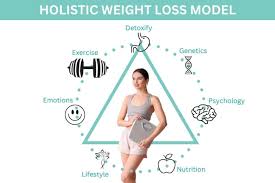
Introduction

In a world filled with quick fixes and fad diets, the concept of healthy weight loss often gets overshadowed. Many seek to lose weight rapidly without understanding the implications of their choices. This guide aims to illuminate the path to sustainable, healthy weight loss, emphasizing the importance of balanced nutrition, regular exercise, and lifestyle changes.
Understanding Weight Loss

What is weight loss? Weight loss is about creating a caloric deficit—burning more calories than you consume. However, this involves a complex interplay of metabolism, hormones, and lifestyle factors.
Many believe that drastic diets can yield lasting results, but such approaches often lead to rebound weight gain. Understanding your body’s unique needs is vital for effective weight loss.
Setting Realistic Goals

Setting goals is crucial for success. Ensure your goals are Specific, Measurable, Achievable, Relevant, and Time-bound. For instance, instead of saying, “I want to lose weight,” aim for, “I will lose 1 pound per week for the next three months.”
Regularly monitor your progress through measurements and tracking your food intake. Celebrate non-scale victories, such as increased energy or improved fitness levels.
Nutrition for Weight Loss

Nutrition is the cornerstone of any weight loss journey. Focus on a balanced intake of macronutrients and ensure you’re getting the necessary vitamins and minerals.
Incorporate whole foods into your diet. Fresh fruits, vegetables, whole grains, lean proteins, and healthy fats should be the foundation of your meals.
Be mindful of portion sizes. Tools like measuring cups or visual aids can help you avoid overeating.
Practice mindful eating by slowing down and savoring your meals. This can prevent emotional eating and help you recognize when you’re full.
Exercise for Weight Loss

Regular exercise not only aids weight loss but also boosts mood and enhances overall health.
Combine aerobic exercises like running or cycling with strength training to maximize fat loss and build muscle. Don’t forget the importance of flexibility exercises like yoga or stretching.
Design a workout plan that fits your schedule and interests. Aim for at least 150 minutes of moderate aerobic activity per week, along with muscle-strengthening activities on two or more days.
Finding activities you enjoy is key to maintaining motivation. Consider working out with friends or trying new classes to keep things fresh.
Lifestyle Changes for Sustained Weight Loss

Lack of sleep can disrupt hormones that regulate hunger, leading to weight gain. Aim for 7-9 hours of quality sleep each night.
Stress can lead to emotional eating. Incorporate stress-reducing techniques such as mindfulness or deep-breathing exercises into your routine.
Having a support system can greatly enhance your weight loss journey. Share your goals with friends or join a community for accountability.
Dealing with Setbacks

lateaus are a normal part of the weight loss process. If you hit a plateau, reassess your diet and exercise routine to make necessary adjustments.
When cravings strike, practice strategies like drinking water, engaging in a distracting activity, or opting for a small, healthy snack.
Long-Term Maintenance

Once you reach your goal, focus on maintaining your weight through healthy habits rather than reverting to old behaviors.
Shift your focus from weight loss to overall health. Prioritize nutritious foods and regular physical activity as part of your daily routine.
Keep evolving your health journey by setting new fitness or wellness goals. This can help you stay engaged and motivated.
Conclusion

Healthy weight loss is a journey that requires patience, dedication, and a willingness to adapt. By focusing on balanced nutrition, regular exercise, and positive lifestyle changes, you can achieve and maintain your weight loss goals. Remember, the path to health is not a sprint but a marathon—take it one step at a time.
